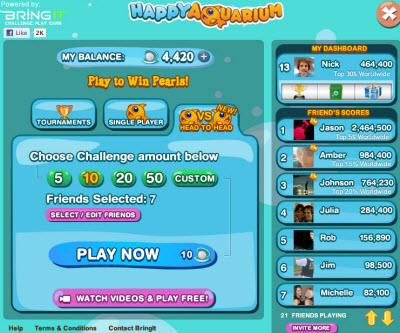 BringIt builds mini games inside Facebook games to encourage players to buy and spend virtual currency. Today, it is adding the ability for players to challenge each other in head-to-head wagering.
BringIt builds mini games inside Facebook games to encourage players to buy and spend virtual currency. Today, it is adding the ability for players to challenge each other in head-to-head wagering.
Most Facebook games are free-to-play. Players can play for free, and perhaps 1 percent to 5 percent will pay real money for virtual goods in the game, such as custom decorations. If BringIt can encourage players to spend more money, then it can help the games generate considerably more revenue, said Woody Levin, chief executive of San Francisco-based BringIt.
“The users get a call to act from their friends to get engaged in the game,” Levin said.
 With the new head-to-head challenges, players can issue challenges to friends and put their own virtual money on the line. BringIt has created a real-time transactional platform that enables social game publishers to add challenges, tournaments, social leader boards, virtual currency collection and payouts to their games. The publishers can embed the platform into the games. I tried it out with Levin, beating him quite handily at a “match three” game.
With the new head-to-head challenges, players can issue challenges to friends and put their own virtual money on the line. BringIt has created a real-time transactional platform that enables social game publishers to add challenges, tournaments, social leader boards, virtual currency collection and payouts to their games. The publishers can embed the platform into the games. I tried it out with Levin, beating him quite handily at a “match three” game.
The mini game launches from inside the Facebook game, and you return to the Facebook game when it is so over. The player never knows that they are moving from one publisher’s game to a BringIt game and back to the publisher’s game. It’s a fully integrated experience.
So far, BringIt is used in seven games and more than 8 million unique players have participated in BringIt’s competitions for virtual currency. The first publishers to offer the new head-to-head challenges are CrowdStar, EastSide Games, Sometrics and Mall World.
With the head-to-head play, BringIt could reach as many as 2.1 million daily active users. In the wagering, players can compete against one friend or many. They can challenge Facebook friends by posting to the walls of the friends. Wagering in this case is legal because players can’t cash out their credits and because the games are based on skill, not chance.
The play can be asynchronous. That is, you can issue a challenge and the other player can take a turn when they log in and see it, so the challenges aren’t limited to playing when friends are online. Players can choose from a variety of BringIt’s Flash mini games. With a single click, players can engage in a rematch. That encourages them to burn through virtual currency and thus spend more money in a game. Virtual currency prizes are rewarded instantly.
The BringIt mini games can add more things to do inside simulation-oriented Facebook games, thereby increasing the player’s engagement with the game. It takes less than a day to integrate BringIt into a social game, adding tournaments, solo challenges, and head-to-head play.
Levin said that so far, BringIt sees a 10 to 12 percent daily active user clickthrough for its mini games, after about three months’ worth of data. The average 30-day retention of those gamers is about 29.5 percent, compared to 17 to 19 percent for typical Facebook apps. That’s what competition does for engagement, Levin said.
BringIt has raised $3.075 million from Blumberg Capital, Seraph Group, and ErGo Media Capital. Levin founded the company in August, 2010. No one else is doing embeddable white label mini game services in this category.



